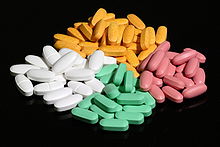A successful trial for oral administration of a cancer treatment drug that is currently administered intravenously was published in the prestigious scientific journal "Cancer Research" -

Yishum The Research and Development Company of the Hebrew University reported today a successful pre-clinical trial in the oral administration of docetaxel (Taxoter), a cancer treatment drug, by using a new nanotechnology platform. The technology, developed by Professor Shimon Benita, Head of the School of Pharmacy at the Hebrew University, enables the controlled release of drugs and increased availability of drugs that are not well soluble in water after administration by ingestion. The findings were published in the prestigious scientific journal cancer research.
Administration by ingestion of drugs that are soluble in fat but not in water is particularly challenging because they are both broken down and actively eliminated from the intestines. One of the main problems that such drugs have to overcome in order to be absorbed in the body is a protein pump known as P-glycoprotein. This protein removes the absorbed drug back into the intestinal cavity.
The drug docetaxel (Taxoter®) is a fat-soluble drug used to treat a variety of solid cancerous tumors. Docetaxel is almost insoluble in water and in addition, the P-glycoprotein pump vigorously removes it from the intestine and prevents its good absorption. For this reason, this drug is given exclusively by infusion, after being dissolved with lipid-soluble substances, which often increases the side effects. The innovative method of administering the drug involves the creation of docetaxel nanocapsules that are packed in slightly larger microparticles in a way that prevents the drug from breaking down and being eliminated from the intestine. As a result, the bioavailability of the drug increases after administration by ingestion, and a continuous release of the drug is possible after it reaches the blood circulation.
The results of the preclinical experiments conducted on rodents showed that the bioavailability of the drug after oral administration of the new microparticles was 10-20 times higher than other methods of oral administration, and the levels of the drug in the blood were high. Despite the high levels achieved, the rats suffered no immediate side effects, evidence that the drug did not adversely affect the intestinal walls. The anti-cancer activity of the new formulation was demonstrated on cell cultures.
In June 2009, Applision signed a cooperation agreement with Orum Ventures MKI, the technology investment arm of Mr. Morris Kahn, to continue the development of the innovative platform for oral administration of drugs.
"Dostaxel is used to treat a variety of cancers, and currently it is given in a high dose in the form of an infusion once every three weeks. The result is side effects that can be quite serious," said Yaacov Michlin, CEO of Yakasim. "For this reason, patients who need this drug will prefer to receive it in lower doses and administered by swallowing. The recently published clinical trial results show that Professor Benita's invention, now being developed by Orum Ventures MKI, has real potential to enable the oral administration of docetaxel to cancer patients. The new platform for oral administration of drugs has already been proven to be effective for other drugs, and it provides a revolutionary method to bypass the powerful barriers to drug absorption in the intestine and liver, and as a result increase the bioavailability of the drugs."
Professor Benita added, "This unique system makes it possible to change the way of administration of drugs that are soluble in fat and are cleared from the intestine by P-glycoprotein. These drugs are currently given by injection, and with the help of the new system it will be possible to swallow them while maintaining high bioavailability and with fewer side effects without affecting the normal physiological activity of the metabolic barriers in the intestine and liver."
